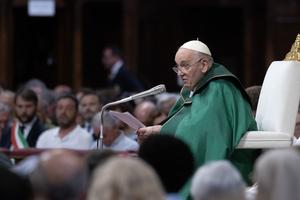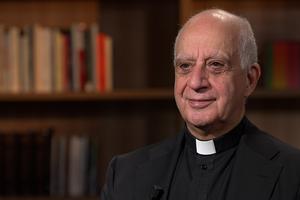A ‘Catholic’ Social Justice Lobby?

WASHINGTON, D.C. — As the yearlong battle over health-care reform came to a head last month, an open dispute over public funding for abortion exposed deep fissures within the Church. Some bishops’ conference staffers privately worried that “polarization in political life is being transferred to ecclesial life.”
During the final week of the bruising health reform negotiations on Capitol Hill, Network, a self-described “national Catholic social justice lobby,” endorsed the Senate bill that was about to be voted on in the House of Representatives. In doing so, they called into question the U.S. bishops’ objections to provisions dealing with abortion funding and conscience protections.
Network wasn’t the only Catholic group to challenge the U.S. Conference of Catholic Bishops, which emerged as the chief pro-life critic of the bill: The Catholic Health Association’s endorsement had already incensed pro-life advocates. Network’s public letter of support for the Catholic Health Association provided additional political cover for the bill’s defenders, who argued that it preserved the status quo on federal funding of abortion.
A month later, the U.S. bishops and conference officials are still angry.
“In the past, we have worked with Network on immigration reform, and they attend some meetings of our coalition,” said Kevin Appleby, director of Migration Policy and Public Affairs at the bishops’ conference. “But working in a coalition requires trust. Network can’t have it both ways: It can’t benefit from the bishops’ advocacy and then undercut them at a strategic moment.”
Appleby’s sense of betrayal was echoed by Bishop Thomas Tobin of Providence, R.I., who recently wrote Sister Carol Keehan, the Catholic Health Association president, to request that the CHA drop a Catholic hospital in his diocese from membership. Any “association with CHA is now embarrassing,” he said.
“Your enthusiastic support of the [health-care reform] legislation, in contradiction to the position of the bishops of the United States, provided an excuse for members of Congress, misled the public and caused serious scandal for many members of the Church,” wrote Bishop Tobin.
Bishop Lawrence Brandt of Greensburg, Pa., prohibited the Sisters of St. Joseph in Baden, Pa., whose leadership team signed Network’s letter endorsing the bill, from receiving diocesan media or parish support for their vocation recruitment effort.
Sister Simone Campbell, executive director of Network, expressed frustration and bemusement at the criticism leveled against her organization.
“What we did was about affirming the Catholic Health Association,” said Sister Simone, a member of the Sisters of Social Service congregation. “Our letter had nothing to do with the bishops; we just have a different take on the bill.”
At issue are Network’s actions during the final week of negotiations between Democratic Party leaders and pro-life holdouts in the House. Network issued a press release March 17 that challenged the substance of the bishops’ opposition to the bill: “[D]espite false claims to the contrary, the Senate bill will not provide taxpayer funding for elective abortions. ... This is the real pro-life stance, and we as Catholics are all for it.”
Further, in an interview with The New York Times, Sister Simone was described as an “anti-abortion” nun, who “did not directly criticize the bishops, but said ‘some people could be motivated by a political loyalty that’s outside of caring for the people who live at the margins of health care in society.’”
The Times’ story suggested that Network was involved in securing both health-care reform and pro-life provisions and thus could be trusted as an unbiased organization. But Network’s website provides no evidence of pro-life work.
Asked to explain Network’s record on life issues, Sister Simone said the lobby historically addressed economic justice concerns in policy debates, including health-care reform. Network’s first workshop on health reform was 36 years ago, and the lobby had kept its focus on quality and affordability.
“I am a person who believes firmly in the dignity of life,” Sister Simone said, but “because we work in coalition, I relied on the CHA to address the abortion issue. Sister Carol Keehan was working with Senators Ben Nelson and Bob Casey on the Senate bill’s language, and I knew she felt satisfied.”
The health-care overhaul battle provided a textbook moral conundrum for longtime social-justice activists who include the unborn in their defense of human dignity. The bishops’ lengthy but ultimately unsuccessful struggle to forge acceptable legislation testified to the priority given to the right to life — and all moral absolutes — in Catholic doctrine.
Sister Simone suggested that her organization engaged in a similar deliberation but reached a different conclusion.
“We felt the right to life has been protected. We could have ducked this whole thing, but there does come a time when policies come up that we don’t normally take a stand on.”
However, Network’s website has provided no sign of any internal debate — or sensitivity to pro-life concerns. More recently, though, the group posted this note on its homepage: “NETWORK congratulates the U.S. House of Representatives for passing the historic healthcare reform legislation. This is a remarkable time in our nation’s history as we finally take concrete steps to bring healthcare to tens of millions of people who have been denied this essential right. Providing them with healthcare while continuing to make sure that federal money does not go to abortion will save many, many lives. NETWORK helped make this happen.”
In 2006, however, Network commended U.S. Rep. Robert Brady, D-Pa., for voting “100% in accordance with Network’s socially responsible agenda for the first session of the 109th Congress.” But Project Vote Smart confirms that Brady also “supported the interests of the NARAL Pro-Choice America 100 percent in 2006.”
1970s’ Style Activism
Founded in 1974 by 47 politically active nuns, Network’s agenda reflects that era’s preference for addressing towering economic and foreign policy issues, such as unemployment and nuclear disarmament.
“My impression of Network in its early days is that it represented a 1970s’ style of social activism, as it was practiced within the ranks of activist nuns of those days. It also reflected the incursions of a feminist sensibility into women’s religious orders,” suggested author Russell Shaw, former USCCB spokesman. “I’m not aware that it ever got involved in the abortion issue.”
Network opened its doors just after the Roe v. Wade decision, and the social consequences of legal abortion had yet to emerge. Mother Teresa would soon begin her lonely campaign, which challenged the notion that a just, peaceful society could coexist with legal abortion.
Four decades later, Americans have grown increasingly concerned about the social cost of abortion. But this sea change hasn’t altered Network’s agenda. Network’s members — a mix of women religious, priests and laypeople — have a strong preference for “peacekeeping,” immigration, health care, housing and employment.
“In a couple of previous administrations, we were taught that taxes are bad. But they are good, and they bring about the common good,” said Sister Marge Clark, a member of the Sisters of Charity of the Blessed Virgin Mary, another Network lobbyist, who cited the U.S. bishops’ economic pastoral to back her position.
Michael Novak, the theologian and author, suggests that Network’s legislative agenda ignores the deep roots of social justice as a virtue that animates human beings and their moral choices.
“Most talk about social justice as an overarching social program, a utopian vision, a political platform, arranged around placing all care for the needy in the hands of the state. In other words, the most common use of social justice no longer provides an alternative to the state,” Novak argued.
Back at the USCCB, Sister Mary Ann Walsh, a conference spokeswoman, provides a concise response to Network’s stance: “There was a difference on how the CHA and USCCB viewed the legislation: The bishops’ position was trust but verify.”
Joan Frawley Desmond writes from Chevy Chase, Maryland.













